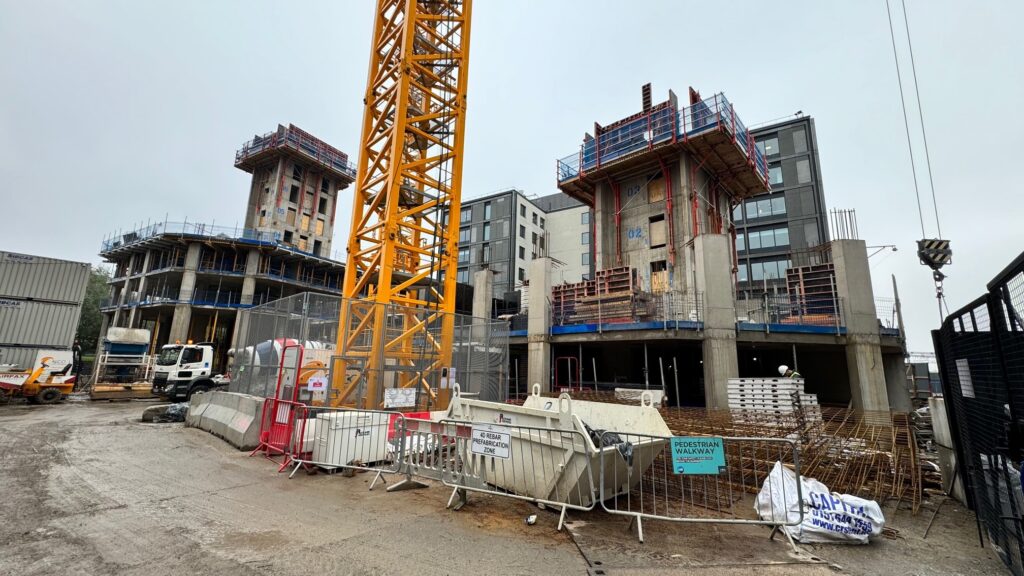The impact of rising energy costs across all professions and households is well documented.
Ofgem reports that gas and electricity prices have increased by 500%.
The construction industry is a major user of energy, with approximately 3% of the UK’s total energy usage being attributed to the sector.
Due to the energy-intensive requirements of construction, such significant increases in the price of energy are likely to have a big impact on the sector.
In this article, we explore what impact the current energy crisis is having on the construction industry, and what can be done to minimise its risk in the future.
Which areas of construction will be affected the most?
Larger, lengthier construction projects
The impact of rising energy costs will no doubt be felt on projects being delivered on a bigger scale, over a longer period of time.
With construction firms having to forecast risk and costs over a longer period, increases in energy prices can jeopardise the financial viability of a project and therefore will need to be factored in from the outset.
This includes construction projects spread across longer timescales. For similar reasoning, these projects are also more likely to feel the brunt of any sudden price hikes that might occur.
Some areas of the construction industry will be hit harder than others.

SME and Subcontractors
SME construction firms and subcontractors are more likely to be impacted by rising energy costs in the near term as most tend to work on fixed-term contracts. This means that any increase in costs will have to be absorbed putting further pressure on these businesses.
In the longer term, as energy costs work their way through the supply chain, we could see an increase in tender prices for larger construction projects.
Impact on contracts being tendered
As energy costs work their way through the supply chain, we are seeing an increase in tender prices for larger construction projects.
Mace Cost Consultancy forecasted that tender prices will rise by 8% in 2022, after seeing a record 7.5% increase in 2021. This will be driven by energy price increases, as well as higher raw materials and labour costs.
If these trends continue, it could lead to a slowdown in the number of construction projects being tendered for, as clients seek to limit their exposure to rising costs.
Construction insolvencies
Rising energy costs are the latest in a series of setbacks for the construction industry over the last 12 months. Construction firms have had to manage their way through a more competitive employment market, higher raw materials costs along with supply chain pressures.
The most recent insolvency figures show that 19% of company insolvencies in the last 12 months (Q3 2021- 2022Q2) were from the construction sector. This represents a 203% increase from the previous 12-month period.
Rising energy costs are only adding pressure to the construction industry, which could lead to an increase in construction insolvencies, as smaller firms struggle to cope with the added costs.
Contracts unable to be delivered and cancelled
The impact of rising energy costs is not just restricted to the financial viability of projects, but also the ability to deliver them on time and to specification.
With construction firms already under pressure to complete projects on time and within budget, any added cost increases the risk of delays and contractual disputes. This could lead to an increase in the number of construction contracts being cancelled by clients or moved to another contractor.
Increase in material costs
According to the Construction Products Association (CPA), building material costs have already increased by 26% in the year to July. This increase has been a result of numerous factors such as a weaker pound and transportation costs.
The spiralling energy costs are only going to add to this pressure, as construction firms will be faced with increased costs for fuel, machinery and equipment.
Energy surcharges on supply chain
Another factor in increased material costs is coming from energy surcharges being passed down the supply chain. With construction firms already struggling to cope with increased costs, these surcharges will add even more pressure.
Companies such as Tarmac Buxton Lime have already started to pass on these charges, with other firms expected to follow suit.

Impact on decarbonisation plans
The construction industry has been under pressure to decarbonise in recent years and rising energy costs could make this even more difficult.
In fact, a recent report by the UK energy research centre predicts that the increase could delay meaningful investment in decarbonisation by as much as five years.
How will the price increases be offset/covered
Tighter margins within contracts
Construction companies could potentially try and manage the increases internally. However, the average operating margin on projects is estimated to be between 1-2%.
However, this is likely to only be possible for construction firms with healthier margins where there is potential room for manoeuvre. For many construction companies, this will not be possible and they will need to look at other alternatives.
Increased project costs delivered to the client
The more likely solution is higher project costs being proposed to the client, as construction firms attempt to recover the added costs. This in turn could impact the number of projects commencing, as clients become more price sensitive in the current market.
With the increased project costs, a likelihood is that the number of projects commencing stagnates, as clients become more price sensitive to the current climate.
The impact of rising energy costs on the construction industry could have a knock-on effect on an already recovering employment sector within construction.
Clauses being inserted within contracts
By inserting clauses within contracts, construction firms can protect themselves from the volatility of energy markets.
Price-adjustment clauses allow for project costs to be increased if there is a change in the cost of materials or labour. This would give construction firms some confidence they can satisfy their contracts, even if there are cost increases along the way.
What can be done to minimise energy volatility in the future
Alternative energy
Alternative energy sources have long been touted as a way to minimise energy volatility within the construction sector.
Decarbonisation and net-zero targets have placed a renewed focus on the role alternative energy can play in reducing emissions.
However, this is likely to be a long-term solution and in the short-term, construction firms will need to find other ways to cope with the impact of rising energy costs.

Government intervention
In recent days the government seem to have acknowledged there is a clear need for support within the construction industry.
On 27th September the government announced a three-month review of its net zero strategy, citing the ongoing war and other global factors that have changed the economic landscape.
The statement says ‘The BEIS Secretary of State has appointed Chris Skidmore MP as review Chair. Reporting by the end of 2022, the review will ensure that delivering the net zero target does not place undue burdens on businesses or consumers.’
Although the above review is welcomed, more support is likely to be required to ensure the construction industry is not disproportionately impacted by rising energy costs.
Conclusion
Whilst supply chain pressures are easing, August’s construction PMI shown that new order growth is at the slowest rate since June 2020 amidst the Coronavirus pandemic.
The construction industry is facing a perfect storm of rising energy costs, the end of the red diesel exemption and tighter margins within contracts.
Despite these difficulties, there are several positives that the construction sector may see from current events. The recent government review indicates a recognition of the sector’s pressures and offers some optimism that support will be forthcoming in the near future.
Looking further ahead, the current plight could expedite innovation within the sector as firms look for more sustainable and cost-effective energy sources. In turn, this could lead to a more efficient and greener construction industry in the long term.













